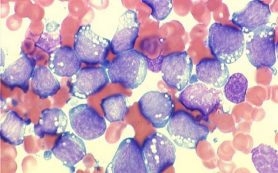- Diseases
- Acoustic Neuroma (14)
- Adrenal Gland Tumor (24)
- Anal Cancer (68)
- Anemia (2)
- Appendix Cancer (16)
- Bile Duct Cancer (26)
- Bladder Cancer (72)
- Brain Metastases (28)
- Brain Tumor (232)
- Breast Cancer (714)
- Breast Implant-Associated Anaplastic Large Cell Lymphoma (2)
- Cancer of Unknown Primary (4)
- Carcinoid Tumor (8)
- Cervical Cancer (160)
- Colon Cancer (166)
- Colorectal Cancer (118)
- Endocrine Tumor (4)
- Esophageal Cancer (44)
- Eye Cancer (36)
- Fallopian Tube Cancer (8)
- Germ Cell Tumor (4)
- Gestational Trophoblastic Disease (2)
- Head and Neck Cancer (12)
- Kidney Cancer (128)
- Leukemia (342)
- Liver Cancer (50)
- Lung Cancer (286)
- Lymphoma (278)
- Mesothelioma (14)
- Metastasis (30)
- Multiple Myeloma (100)
- Myelodysplastic Syndrome (60)
- Myeloproliferative Neoplasm (6)
- Neuroendocrine Tumors (16)
- Oral Cancer (100)
- Ovarian Cancer (172)
- Pancreatic Cancer (160)
- Parathyroid Disease (2)
- Penile Cancer (14)
- Pituitary Tumor (6)
- Prostate Cancer (146)
- Rectal Cancer (58)
- Renal Medullary Carcinoma (6)
- Salivary Gland Cancer (14)
- Sarcoma (238)
- Skin Cancer (296)
- Skull Base Tumors (56)
- Spinal Tumor (12)
- Stomach Cancer (64)
- Testicular Cancer (28)
- Throat Cancer (92)
- Thymoma (6)
- Thyroid Cancer (98)
- Tonsil Cancer (30)
- Uterine Cancer (82)
- Vaginal Cancer (18)
- Vulvar Cancer (20)
- Cancer Topic
- Adolescent and Young Adult Cancer Issues (20)
- Advance Care Planning (10)
- Biostatistics (2)
- Blood Donation (18)
- Bone Health (8)
- COVID-19 (362)
- Cancer Recurrence (120)
- Childhood Cancer Issues (120)
- Clinical Trials (632)
- Complementary Integrative Medicine (22)
- Cytogenetics (2)
- DNA Methylation (4)
- Diagnosis (232)
- Epigenetics (6)
- Fertility (62)
- Follow-up Guidelines (2)
- Health Disparities (14)
- Hereditary Cancer Syndromes (126)
- Immunology (18)
- Li-Fraumeni Syndrome (8)
- Mental Health (116)
- Molecular Diagnostics (8)
- Pain Management (62)
- Palliative Care (8)
- Pathology (10)
- Physical Therapy (18)
- Pregnancy (18)
- Prevention (920)
- Research (392)
- Second Opinion (74)
- Sexuality (16)
- Side Effects (604)
- Sleep Disorders (10)
- Stem Cell Transplantation Cellular Therapy (216)
- Support (402)
- Survivorship (322)
- Symptoms (182)
- Treatment (1786)
New drug helps 'bridge' leukemia patients to curative treatment
BY Ron Gilmore
2 minute read | Published July 13, 2016
Medically Reviewed | Last reviewed by an MD Anderson Cancer Center medical professional on July 13, 2016
In a randomized Phase III study of the drug inotuzumab ozogamicin, a statistically significant percentage of patients with acute lymphoblastic leukemia (ALL) whose disease had relapsed following standard therapies, qualified for stem cell transplants.
Inotuzumab ozogamicin, also known as CMC-544, links an antibody that targets CD22, a protein found on the surface of more than 90 percent of ALL cells. Once the drug connects to CD22, the ALL cell draws it inside and dies.
The study, which revealed complete remission rates of nearly 81 percent and significantly longer progression-free and higher overall survival rates than with standard therapies, was conducted at MD Anderson Cancer Center. Study findings were reported in the June 12 online issue of the New England Journal of Medicine.
“Forty-one percent of ALL patients in the study were able to proceed to transplant after receiving inotuzumab ozogamicin compared with the 11 percent we have seen qualify through standard chemotherapy,” said Hagop Kantarjian, M.D., chair of Leukemia. “Given that stem cell transplant is considered the only curative treatment option, the ability of inotuzumab ozogamicin to increase the number of patients able to bridge to transplant is encouraging.”
Donor stem cell transplants generally are considered curative for this aggressive form of leukemia with more than 6,500 American adults expected to be diagnosed with the disease in 2016. However, patients must be in complete remission before they are eligible for transplant.
Current therapies for adults with newly diagnosed B-cell ALL result in complete remission rates (CR) of 60 to 90 percent. However, many of those patients will relapse and only about 30 to 50 percent will achieve long-term, disease-free survival lasting more than three years.
“Standard chemotherapy regimens result in complete remission in 31 to 41 percent of patients who relapse earlier, and just 18 to 25 percent in those who relapse later,” said Kantarjian. “Patients in the inotuzumab ozogamicin study had remission rates of 58 percent, higher than previously reported, possibly due to patients being treated later in the disease course.”
Read more about this study in MD Anderson's newsroom.

